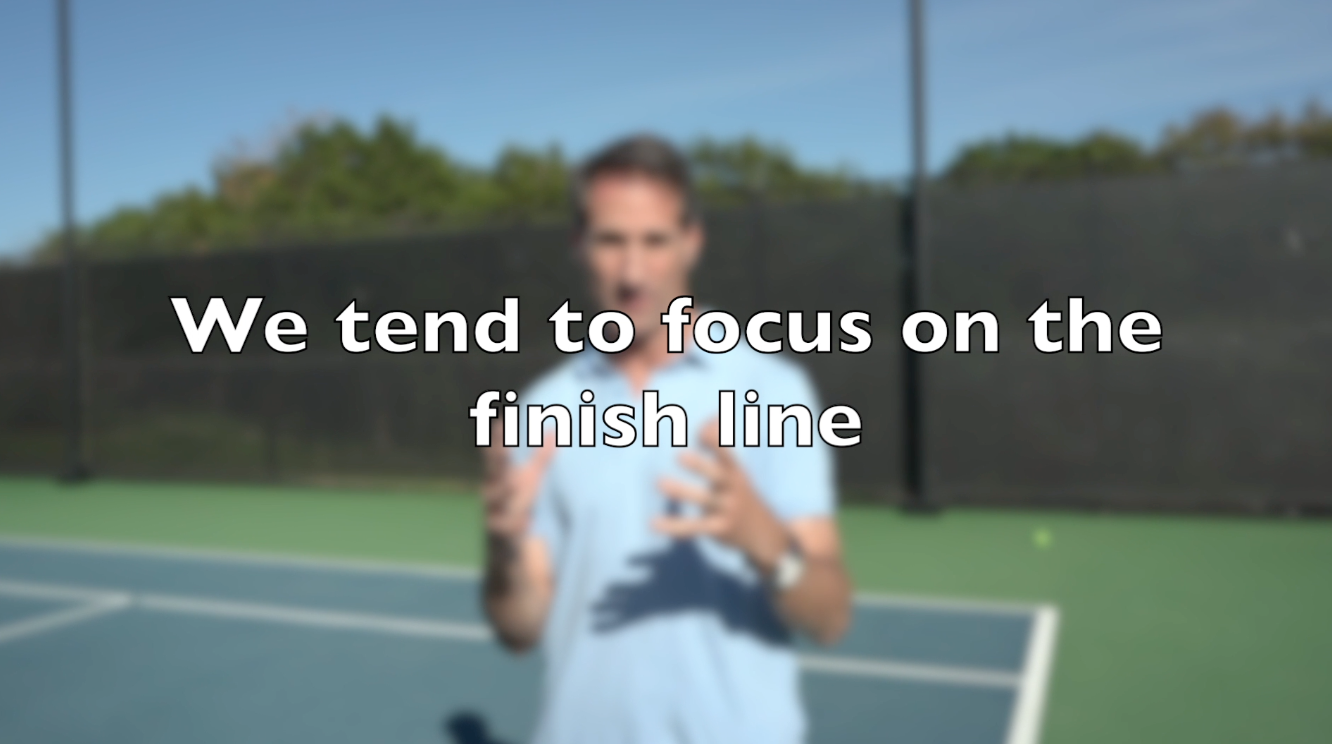G’day,
Very excited about the launch of Getting Tight in just two days! You will be able to purchase it Monday morning at 8:00 am US Central time.
This video is focused on players that start well, get ahead, and then for whatever reason can’t close out a lead. It’s almost like they start playing a new sport to finish off a set or finish off a match. This is typically what happens to the mental game:
Early In the Set: The focus is on the game plan. The focus is on the opponent’s strengths and weaknesses and employing the best patterns of play. The focus is on running primary patterns most of the time and switching to secondary patterns when the point score is in your favor.
Later In The Set:
- The focus is on the finish line 🏁
- The focus is on the finish line 🏁
- The focus is on the finish line 🏁
Today’s two-minute video comes straight from Getting Tight and is a discussion Jeff and I had to help players perform better in this specific situation.
Getting Tight Sneak Peek Video: Closing Out A Lead.
Mini-Lessons
Jeff and I expand on the key focus points in the video to provide more depth and understanding of what we talked about.
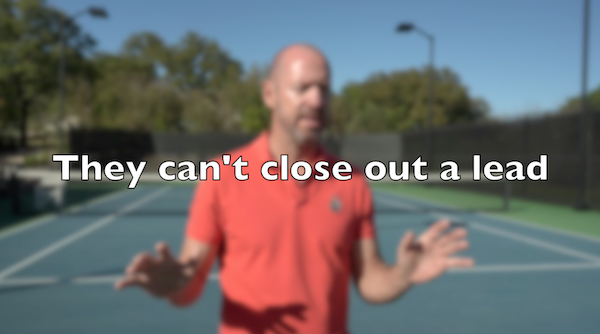

- It is natural for the mind to jump ahead when you are in the lead.
- Sometimes your mind may relax for a moment and you will lose your focus and intensity.
- Other times, your mind may worry that you won’t actually get over the finish line with a victory so you start protecting against errors.
- It’s important to be proactive and coach yourself to focus on the task at hand before your mind has a chance to wander.
- Remind yourself to stick with the strategy that is working. There is no need to change a winning game. Especially if you make a few mistakes, don’t panic.
- Come back to your intentions for the match and commit to the strategy that got you to this point. If you lose a few games, the same mindset applies. Don’t panic.
- You may still be up in the score and just because you lost a few games doesn’t mean you are going to lose the match.
- Focus your attention on what will help you win – controlled aggression, more patience, and commitment to your winning strategy.
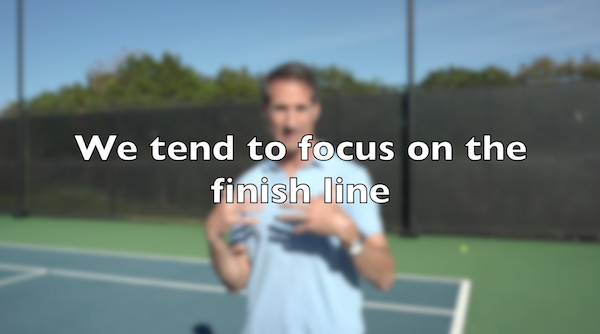

- The mind has three places it can be anytime you are on or off the court.
- It can be in the past, present or future.
- When you are leading or about to close out the set or match, your mind will automatically shift into the future.
- How long you allow it to stay there is crucial.
- This is where awareness is important so as soon as it shifts into the future you gently come back to something specific and productive such as your target when serving, or a positive reminder such as “one point at a time” or “play on your terms”.
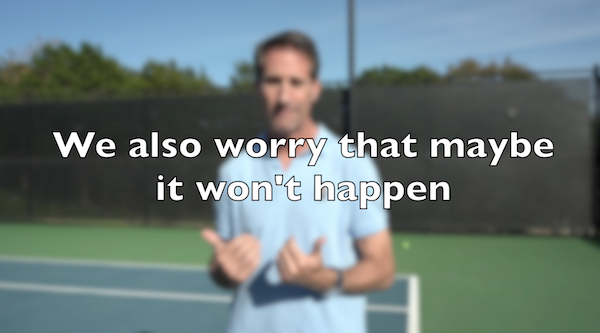

- It’s okay to hate to lose. Many competitive players are like this.
- But, you don’t want to be scared of losing.
- I understand that having significant leads and then losing them hurts even more if you do happen to lose, but, it happens to everyone.
- Don’t guard against this disappointment in advance. You will get over your loss much faster than your mind is allowing you to think in the heat of the battle.
- What matters is HOW you choose to focus your mind when you are in these challenging moments. Can you settle down and narrow your focus on your tactic and targets? Are you willing to hit through the ball and not be a victim of your frustration and anger?
- Get back to the things that will help you focus and play well.
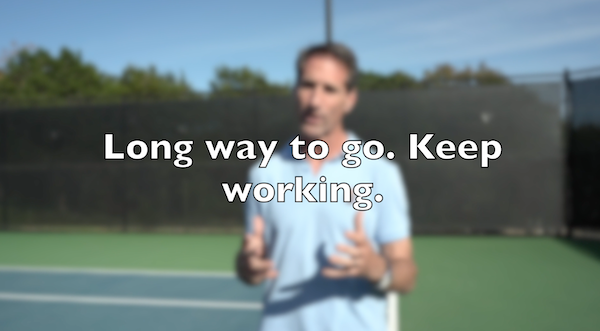

- This positive affirmation will help you keep your focus on the task at hand.
- Instead of allowing your mind to wander in the future and anticipate the result, you are coaching yourself to stay in the present and to stay productive with your thoughts.
- Become a “warden” – the one in charge of the inmates in a prison. Your negative, outcome thoughts are the prisoners. Keep these thoughts in check.
- This means you need to be aware of what’s happening in your head so you can set limits on the activity.
- This awareness will go a long way to helping you catch your mind when it wanders into the past or future. Being in the present is the goal. Easier said than done, I know. But, with practice, it can improve dramatically.
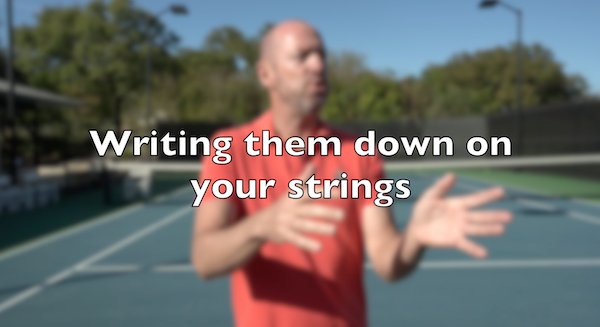

-
You need a place to put your focus so your mind doesn’t wander.
-
Using your strings can keep your eyes in once place.
-
This is an opportunity to assess the next point or reset depending on what you need in the moment.
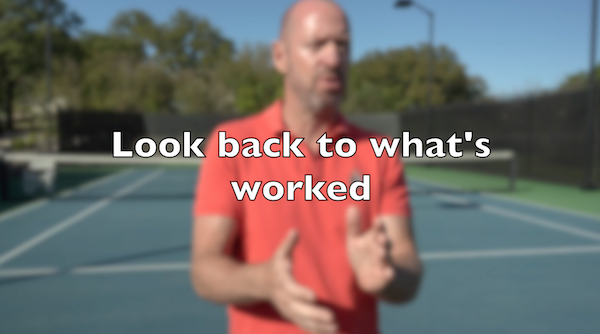

- You may find that you are so caught up in the match, worrying about the score, your last error or what people might be thinking on the side of the court if you lose.
- It can be helpful to take a moment and recall how you were winning the points.
- Again, this requires you to step back, widen your focus and visualize what shots/patterns have been effective.
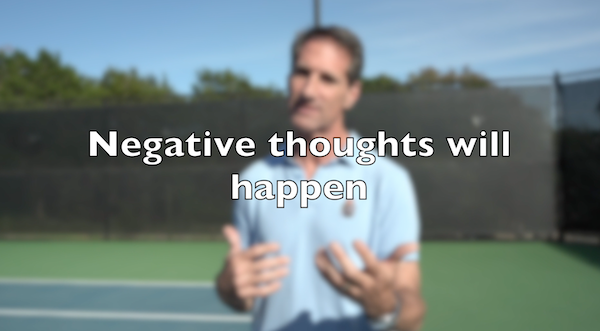

- Research shows that we have about 9 negative thoughts to every one positive thought.
- The point is that it is important for you to be aware of these automatic negative thoughts (aka “ants”) so you aren’t impacted by them as frequently.
- Again, similar to a feeling of “tightness” you want to accept the thought so you can either replace it with a positive thought (ie. “That shot was so bad” replaced by “It’s just one point”).
- Another option is to wipe the thought away with what I call a “windshield wiper” in your mind and then refocus on something productive such as the ball or the spot where you’re serving/returning).
- It’s imperative that you don’t panic just because you have a negative thought.
- The ANTS will come and go but don’t let yourself get carried down the anthill!


- Like most people, you may be seeing situations “from” your thoughts.
- Remember, that thoughts are not facts.
- Fear might be pushing its way through the door. Simply refocus your mind back to the present and let the negative thought disappear as you are engaged with something else.
- Don’t try to “get rid” of the thought. It will disappear on its own when you refocus and don’t give the thought any extra attention.
All the very best,
Craig

